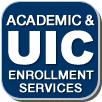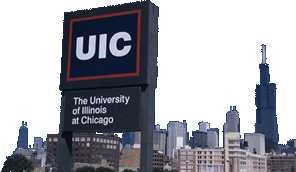Instructional Leadership
Important Note: This is the archived version of the 2012–2014 Graduate Catalog. The information on these pages was archived on August 22, 2012 and will not be updated as requirement and/or program changes are approved.
Admission Requirements Degree RequirementsMailing Address:
College of Education (MC 147)
1040 West Harrison Street
Chicago, IL 60607-7133
Chicago, IL 60607-7133
Campus Location: 3145 EPASW
Telephone: (312) 996-4532
Program Code: Early Childhood Education: 20FS8549MED; Elementary Education: 20FS8550MED; Literacy, Language, and Culture: 20FS4070MED; Science Education: TBA; Secondary Education: 20FS8547MED; Educational Studies: 20FS4069MED Policy Studies: 20FS5102MED.
E-mail: agarci5@uic.edu
Web Site: http://education.uic.edu/
Dean of the College of Education: Victoria Chou
Department Chairperson: Timothy Shanahan
Director of Graduate Studies: William Watkins, Alfred Tatum
The College of Education offers course work which leads to the Master of Education in Instructional Leadership, with concentrations in Early Childhood Education (with strands leading to the MEd only or to Type 04 certificate with an endorsement in Early Childhood Special Education); Elementary Education; Literacy, Language, and Culture (with strands leading to the MEd only, or with the Reading Endorsement, or with the Type 10 certificate); Policy Studies; Secondary Education (Type 09 certificate); Science Education (with a strand leading to the MEd with a Type 09 certificate and a strand with advanced studies in science education only); or Educational Studies, an individualized program designed by the student with the approval of an advisor. The Bilingual and/or English as a Second Language (ESL) approval or endorsement can be awarded with the Type 04, Type 03, Type 10, and Type 09 certificates; contact the College of Education for specific course requirements. The middle school endorsement can be awarded with the Type 03 and Type 09 certificates, or to individuals who already have one of these certificates; see the college Web site for requirements.
Admission Requirements
Applicants are considered on an individual basis. The following requirements for admissions represent recommended minimum levels of performance. Decisions are made on the strength of the overall evidence of academic and professional capacities and on available enrollment space. Applicants to the Secondary Education concentration must submit transcripts from all undergraduate work; applicants to the other concentrations must submit transcripts from the last 60 hours of undergraduate work. Applicants to all concentrations must also submit transcripts from all postbaccalaureate work. In addition to the Graduate College minimum requirements, applicants must meet the following program requirements:
Master of Education
- Baccalaureate Field No restrictions.
- Grade Point Average
- Science Education (Strand A: Certification Option): Requires a 3.00/4.00 for the final 60 semester (90 quarter) hours of undergraduate study, a 3.00 for any post baccalaureate/graduate course work, with the exception of a 2.50/4.00 in a science field.
- Science Education (Strand B: Noncertification Option): Requires a 3.00/4.00 for the final 60 semester hours (90 quarter) hours of undergraduate study and for all postbaccalaureate/graduate course work.
- Secondary Education: Requires a 3.00/4.00 for the final 60 semester (90 quarter) hours of undergraduate study, a 3.00 for any postbaccalaureate/graduate course work, and a 3.00/4.00 for the courses in the undergraduate major or in the intended teaching subject.
- Policy Studies: Requires a 3.00/4.00 for the final 60 semester (90 quarter) hours of undergraduate study and for all postbaccalaureate/graduate course work.
- Other Concentrations: Recommended minimum of 2.75/4.00 for the final 60 semester (90 quarter) hours of undergraduate study and at least 3.00 for all postbaccalaureate/graduate course work.
- Tests Required For programs leading to Illinois certification, passing scores on the Illinois Basic Skills Test or the Illinois Test of Academic Proficiency. Scores must be received by the application deadline.
- Minimum English Competency Test Score
- TOEFL 550 (paper-based); 80, with subscores of Reading 19, Listening 17, Speaking 20, and Writing 21 (iBT Internet-based). Note: Total score is higher than the sum of the subscores. OR
- IELTS 6.5, with subscores of 6.0 for all four subscores.
- Letters of Recommendation
- Early Childhood Education, Elementary Education, Secondary Education, Science Education, and Educational Studies: Three letters addressing the applicant’s academic qualifications, teaching experience, and ability to carry on advanced degree studies. Letters should be from current or former professors or supervisors.
- Literacy, Language, and Culture: Two letters required addressing the applicant’s academic qualifications, teaching experience, research ability, and ability to carry on advanced degree studies. At least one of these letters should be written by a former professor or supervisor familiar with the applicant’s academic work in an undergraduate or graduate setting.
- Policy Studies: Three letters of recommendation attesting to the applicant’s capacity for graduate-level studies. Letters may be from current or former professors or supervisors.
- Other Requirements
- Early Childhood Education: A 3–4 page questionnaire addressing the applicant’s relevant background and experience, interest in young children, and goals for the MEd program. Applicants must also interview with program faculty.
- Elementary Education: A 3–4 page statement of professional goals addressing the applicant’s relevant background and experience, interest in elementary-aged children, and goals for the MEd program.
- Literacy, Language, and Culture: A resume and personal statement (500–1000 words) that indicates strand of interest and addresses relevant personal background, professional experiences, and professional goals. For Strand B, two years of teaching experience are required. For Strands A and B, test results are required from the Basic Skills Test (or the Illinois Test of Academic Proficiency) and Content Test are required. Strand B also requires test results from the Assessment of Professional Teaching.
- Policy Studies: Applicants must submit a 3–4 page statement of professional goals and reasons for seeking admission to this concentration.
- Secondary Education: A 3–4 page statement addressing the applicant’s commitment to and/or experiences working with urban youth. The Secondary Education concentration also requires 18 hours of courses in the subject area the applicant would like to teach and an interview with advisory staff. This concentration requires transcripts from all undergraduate and postbaccalaureate work.
- Science Education (Strand A: Certification Option): A 3–4 page statement addressing the applicant’s commitment to and/or experiences working with urban youth, and experiences with learning science. The Science Education concentration also requires a minimum of 18 hours (toward the the total hours required) in the science area the applicant would like to teach and an interview with advisory staff. This concentration requires transcripts from all undergraduate and postbaccalaureate work.
- Science Education (Strand B: Noncertification): A 3–4 page statement of the professional goals addressing the applicant’s reasons for pursing this MEd and relevant background and experiences with urban education and science education.
- Educational Studies: A 3–4 page statement of the professional goals addressing the applicant’s relevant background and experience, and goals for the MEd program.
- All Concentrations Submit materials required by the specific concentration directly to the College of Education at one time in a large envelope. All materials must be submitted by the stated application deadlines. Applicants should give themselves enough time to gather all materials (especially letters of recommendation) and submit them by the deadline.
- Deadlines The application deadlines for these concentrations are earlier than the Graduate College deadline; contact the College of Education for information on current deadlines.
Degree Requirements
In addition to the Graduate College minimum requirements, students must meet the following program requirements:
Master of Education
- Minimum Semester Hours Required Varies by concentration.
- Early Childhood Education—Strand A (includes Type 04 Certificate with an endorsement in Early Childhood Special Education): MEd, 33–34 hours. Note that students complete additional hours for certification, 11 or 15 hours.
- Early Childhood Education—Strand B (MEd only): 32 hours.
- Elementary Education: 35 hours. Note that students complete additional hours for student teaching to earn Type 03 certification
- Science Education—Strand A (Certification Option): 34 hours. Note that students complete additional hours to earn Type 09 certification.
- Science Education—Strand B (Noncertification Option) 32–36 hours
- Secondary Education: 34 hours. Note that students complete additional hours student teaching to earn Type 04 certification.
- Educational Studies: 32 hours.
- Literacy, Language, and Culture: 39 hours.
- Policy Studies: 32 hours.
- Course Work
- Early Childhood Education—Strand A–Certification Option: ED 422 or EPSY 526; SPED 506; EPSY 429, EPSY 449; EPSY/SPED 582; CI 509; EPSY/SPED 466; EPSY 520; and SPED 508. Courses required for certification are: EPSY 519; and EPSY 521 or EPSY 522.
- Early Childhood Education—Strand B–Degree Only: ED 402 or ED 403 or EPSY 449; ED 422 or EPSY 526; ED 430 or 431; EPSY 429; EPSY/SPED 582; CI 509; EPSY 519 or EPSY 520 or SPED 508 or EPSY 596. 6–8 semester hours of graduate work offered by the College of Education and selected with consent of the faculty advisor.
- Elementary Education: ED 402 or 403; ED 421 or ED 422; SPED 410; CI 410, 411, 412, 413, 507, 508, 511, and 512; CI 464 or 505.
- Science Education
- Strand A (Certification Option): ED 402 or 403; ED 421 or 445; ED 432; EPSY 553; SPED 410; CI 529, 504, 551; and CHEM 572 or PHYS 494 or CI 530; and student teaching, which is required for teacher certification.
- Strand B (Non-Certification Option): ED 402 or 403 or EDPS 500; ED 421 or 445 or EPSY 501; EPSY 416 or 553; CI 518, 551, 570, 573; one selective chosen from an approved science education concentration list; and one elective in science or engineering selected with the consent of the faculty advisor.
- Secondary Education: ED 402 or 403; ED 421 or 445; ED 429, 432, and 580; SPED 410; CI 428, 504; and all required teaching areas and methods courses for teachers in designated teaching field, and other course work selected with the consent of the faculty advisor.
- Educational Studies: ED 402 or 403; ED 421 or 422 or 445; ED 430 or 431; and 14 semester hours of graduate work offered by the College of Education and selected with consent of the faculty advisor.
- Literacy, Language, and Culture: ED 402 or 403; ED 421 or 422 or 445; CI 450; CI 503 or 504; CI 535 and CI 536. In addition to the above courses, students must complete one of the following 3 strands:
- Strand A (Reading Endorsement and Literacy Leadership)—EPSY 553, CI 528, CI 542, and two from: CI 541, 543, 544, 546, 547.
- Strand B (Reading Specialist Certification)—CI 525, 526, 527; and 2 elective courses (8 hours) taken with advisor approval.
- Strand C (Literacy Studies)—20 hours of electives selected in consultation with and approved by the program advisor.
- Policy Studies:
- Core Requirements (9 hours)—ED 402 or 403; ED 421, 422, or 445; and ED 430 or 431.
- Concentration (12 hours)—Twelve semester hours of selectives in policy studies (400- and 500-level courses from the EDPS rubric that are not designated as courses reserved for doctoral students) chosen with an advisor.
- Electives (11 hours)—Eleven semester hours of general electives to be chosen in consultation with and approved by a faculty advisor. A maximum of four semester hours of EDPS 596—Independent Study may be taken as a general elective.
- Nine of the concentration/elective hours must be taken at the 500-level.
- Comprehensive Examination Required only for students in the Literacy, Language, and Culture concentration; written.
- Thesis, Project, or Course-Work-Only Options Course work only. No other options are available.
Interdepartmental Concentration
in Gender and Women’s Studies
Students earning a graduate degree in this department may complement their courses by enrolling in a concentration in Gender and Women’s Studies after consulting with their graduate advisor. See Gender and Women’s Studies in the College of Liberal Arts and Sciences section of the catalog for more information.




